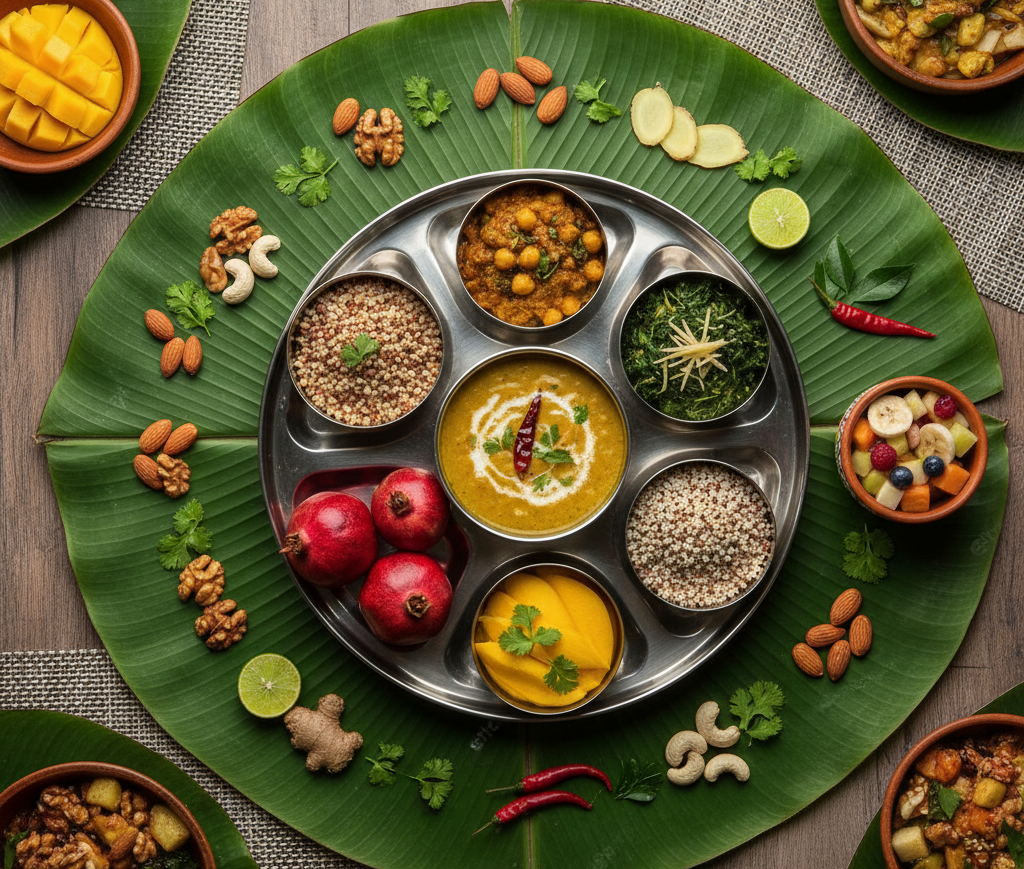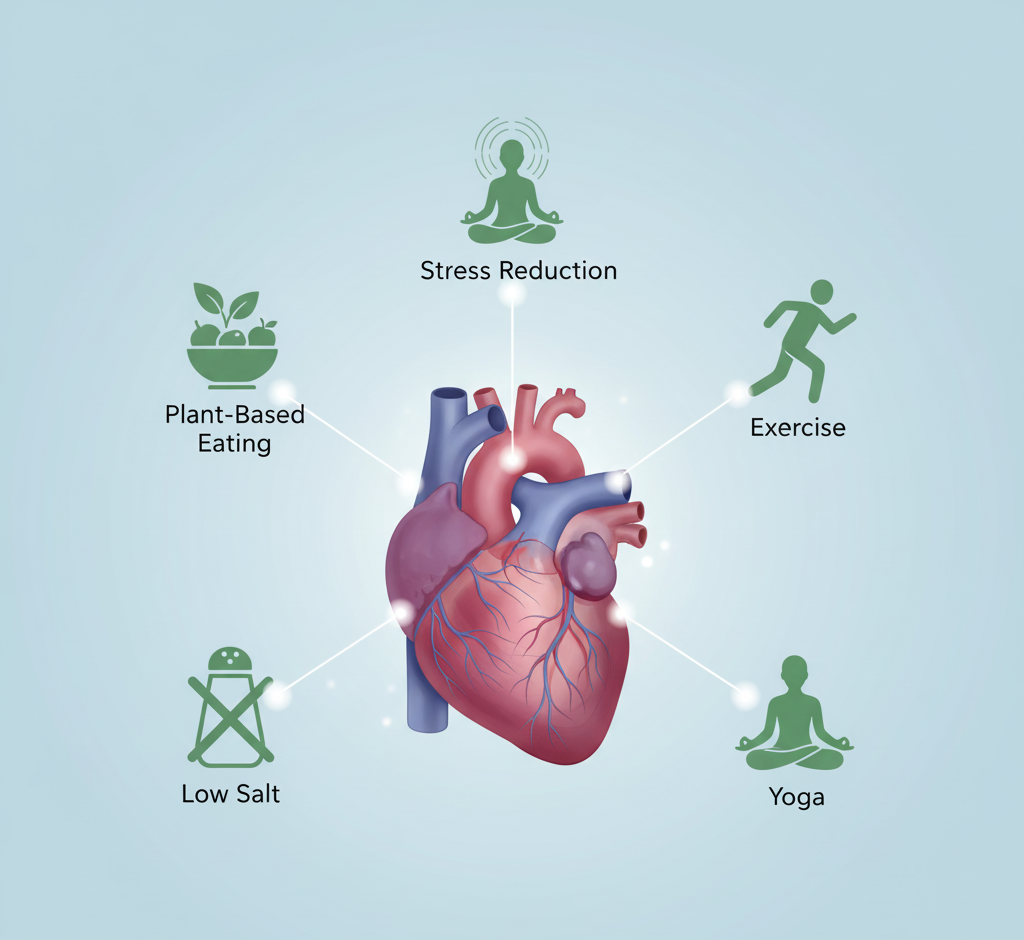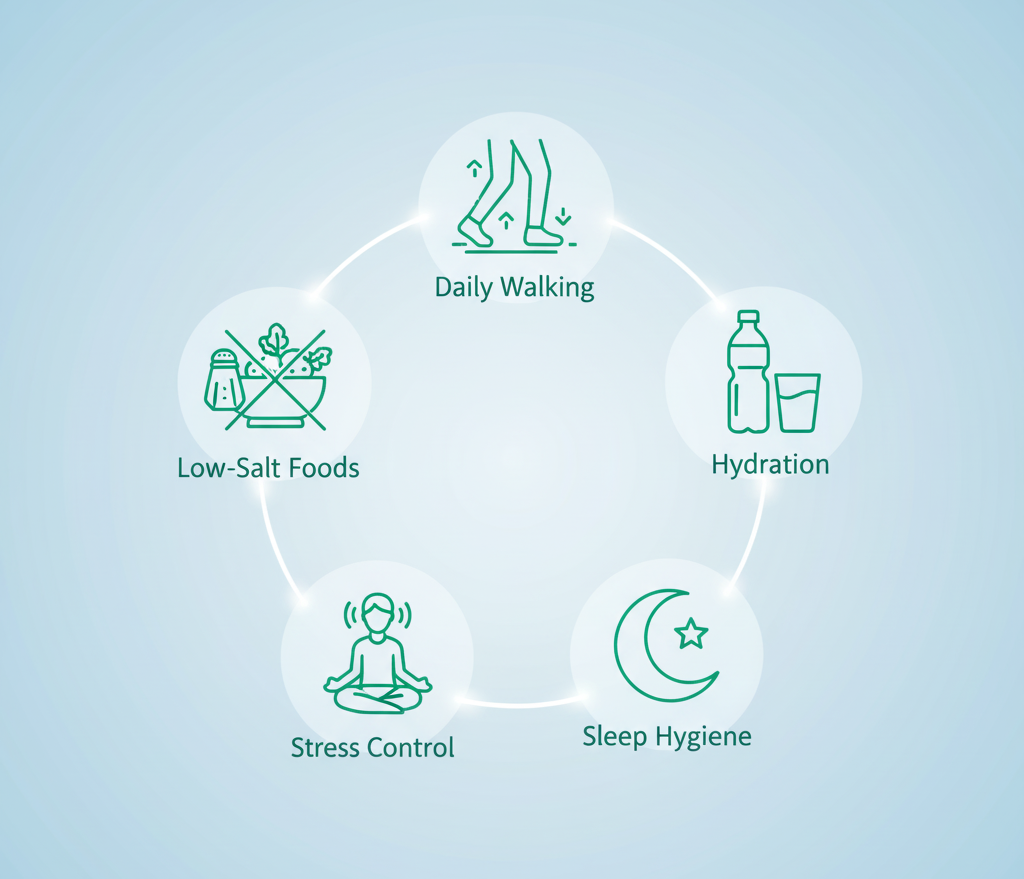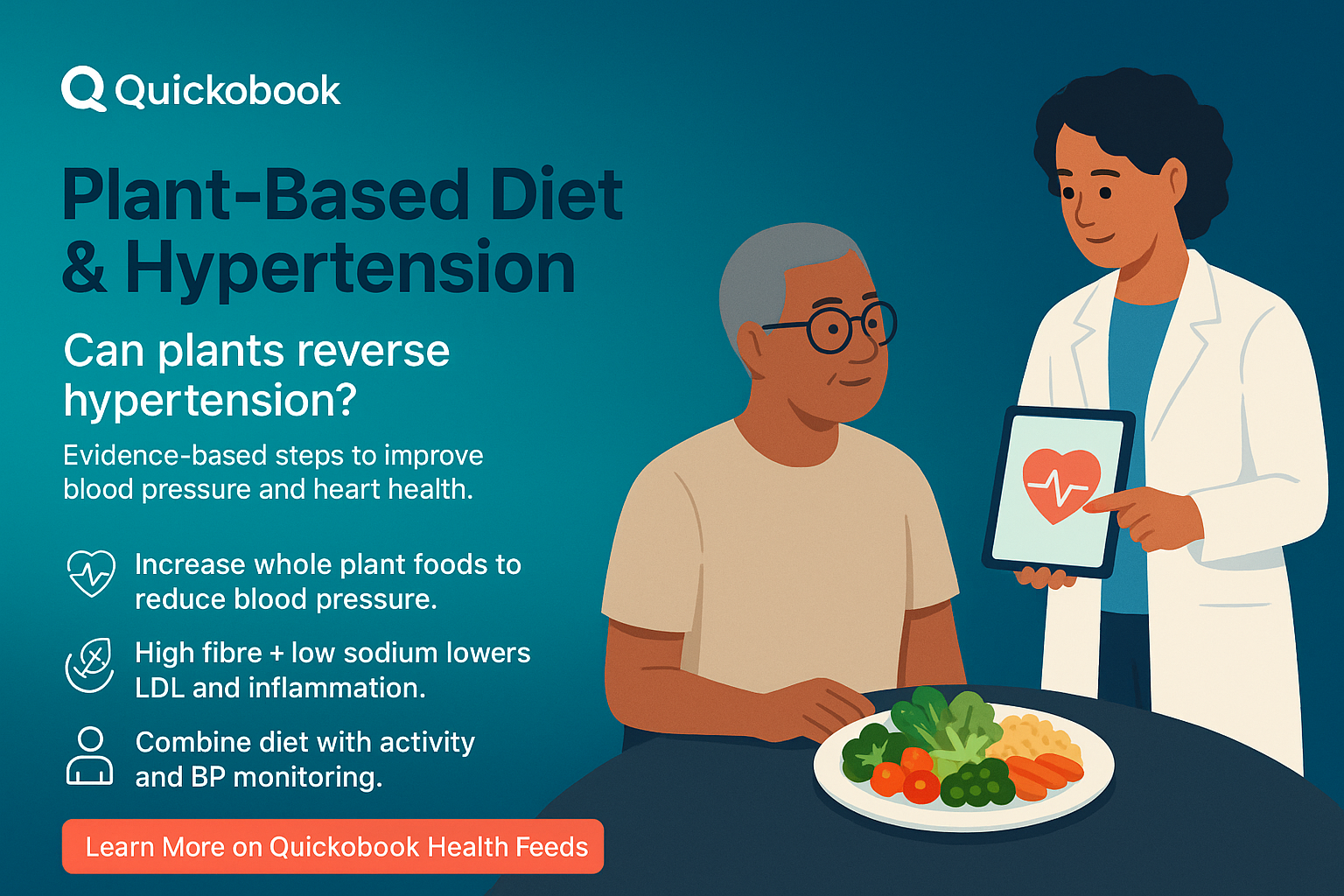Introduction
Heart disease continues to be one of India's most serious health concerns, especially due to widespread hypertension (high blood pressure). Recently, researchers studying hypertensive rats observed something encouraging: a plant-based diet, particularly one low in salt, appeared to reverse some heart damage.
While this research was done in animals, it highlights the strong impact that healthy eating can have on heart health. With rising stress, increased packaged food consumption, and sedentary lifestyles in India, adopting a diet rich in plant foods has become more important than ever.
This blog explains the science behind these findings, how they relate to human heart health, practical diet tips for Indian families, symptoms to watch for, treatment options, lifestyle advice, prevention strategies, and a full 50-question FAQ set.

What a Plant-Based Diet Means
A plant-based diet focuses mainly on foods such as:
-
Vegetables
-
Fruits
-
Whole grains
-
Dal, chana, rajma, and other legumes
-
Nuts and seeds
-
Plant oils in limited amounts
It reduces or avoids:
-
Red meat
-
Fried foods
-
Processed foods
-
High-fat dairy
-
Packaged, high-salt snacks
The emphasis is on healthy eating that supports heart function, digestion, and blood pressure control.
How the Rat Study Worked
Researchers divided hypertensive rats into two groups. One group received a standard diet, while the other was given a plant-based, low-salt diet. Over several weeks, rats eating plant foods showed:
-
Lower blood pressure
-
Reduced thickening of the heart muscles
-
Healthier arteries
-
Less inflammation
-
Improved heart pumping function
Although human outcomes may differ, the biological pathways—reduced sodium, increased fiber, antioxidant support—are relevant to human health.
How a Plant-Based, Low-Salt Diet Supports the Heart
Lower blood pressure
Plant foods naturally contain less sodium. Lower salt intake helps reduce fluid retention and arterial pressure.
Healthier cholesterol levels
A plant-based diet reduces LDL (bad cholesterol) because it contains fiber and minimal saturated fats.
Reduced inflammation
Plant antioxidants protect blood vessels from damage caused by stress and unhealthy foods.
Better artery flexibility
Cleaner, healthier arteries help blood flow smoothly, relieving pressure on the heart.
Weight control
Plant-based meals are filling but lower in calories, helping maintain a healthy weight—important for controlling hypertension.
Can Heart Disease Actually Reverse in Humans?

Some human studies have shown improvement, including early reversal of heart disease, when patients adopt:
-
A plant-heavy diet
-
A low-salt diet
-
Regular exercise
-
Weight management
-
Stress reduction
-
Smoking cessation
However:
-
Not every patient will experience reversal.
-
Severe heart disease requires medical care and sometimes surgery.
-
A professional should supervise all lifestyle modifications.
-
Diet is a tool, not a replacement for medicines.
Common Symptoms of Hypertension and Heart Disease
You may experience:
-
Headaches
-
Fatigue
-
Breathlessness
-
Chest pain
-
Dizziness
-
Palpitations
-
Swelling of feet
-
Nosebleeds (rare)
Many people with hypertension have no symptoms, making routine checkups crucial.
ALSO READ: Chronic Pain May Dramatically Raise Your Blood Pressure
How Doctors Diagnose Hypertension and Heart Disease
A specialist may advise:
-
Blood pressure monitoring
-
ECG
-
Echocardiography
-
Lipid profile
-
Kidney function tests
-
Stress test
-
24-hour Holter monitoring
-
CT coronary angiography if required
Treatment Options
Lifestyle modifications
-
Follow a low-salt diet
-
Shift toward plant-heavy meals
-
Reduce oil and fried items
-
Exercise regularly
-
Practice yoga or meditation
-
Avoid alcohol and smoking
Medicines
Doctors may prescribe blood pressure medications such as:
-
ACE inhibitors
-
ARBs
-
Beta-blockers
-
Diuretics
-
Calcium channel blockers
Dosage depends on the doctor. Never self-adjust medicines.
Medical procedures
For severe disease:
-
Angioplasty
-
Bypass surgery
-
Valve repair
-
Pacemaker implantation (in select cases)
How to Adopt a Plant-Based, Low-Salt Diet in India
Foods to focus on
-
Dal, chana, rajma
-
Bajra, jawar, brown rice, oats
-
Fresh vegetables and leafy greens
-
Fruits such as papaya, apple, banana, guava
-
Almonds, walnuts
-
Flaxseed, chia seeds
-
Mustard, groundnut, or olive oil (small amounts)
Foods to limit
-
Pickles
-
Papad
-
Bakery items
-
Chips, bhujiya, and packaged snacks
-
Instant noodles
-
Frozen processed meat
-
Excess restaurant food
Daily salt recommendations
-
1 teaspoon (5 grams) salt per day, or less
-
Avoid extra table salt
-
Prefer fresh home-cooked food

Prevention of Hypertension and Heart Disease
-
Maintain a healthy weight
-
Eat more plant foods
-
Reduce salt
-
Sleep 7–8 hours
-
Limit caffeine
-
Manage stress
-
Go for yearly checkups
-
Stay active throughout the day
When to See a Doctor
Seek medical help if you experience:
-
Chest pain
-
Severe headache
-
Shortness of breath
-
Swelling in your legs
-
High BP readings above 140/90 repeatedly
-
Episodes of fainting or dizziness
-
Palpitations
-
Sudden fatigue
Quickobook can help you connect with cardiologists, general physicians, and dietitians across India for blood pressure management and heart care.
Possible Risks and Complications of Untreated Hypertension
-
Stroke
-
Heart failure
-
Kidney damage
-
Vision loss
-
Heart attack
-
Peripheral artery disease
-
Sexual dysfunction
-
Cognitive decline
Controlling blood pressure early can prevent most complications.
50 FAQs
1. Can a plant-based diet reverse heart disease?
It may help in early stages when combined with lifestyle changes, but results vary among individuals.
2. Does a low-salt diet lower blood pressure?
Yes, reducing salt is one of the most effective ways to lower blood pressure naturally.
3. Can rat studies apply to humans?
They provide insight, but human bodies respond differently.
4. What are the best plant proteins?
Dal, chana, rajma, tofu, nuts, and seeds are excellent plant proteins.
5. How much salt should a hypertensive person consume?
Ideally less than 5 grams (one teaspoon) per day.
6. Can healthy eating replace blood pressure medicines?
No, but it can support your treatment and improve outcomes.
7. Are bananas good for hypertension?
Yes, they contain potassium, which helps balance sodium.
8. Can hypertension be reversed?
Mild hypertension may improve with diet and exercise, but not always fully reverse.
9. Is rice allowed in a low-salt diet?
Yes, rice contains no salt unless added.
10. Are plant-based diets safe for diabetics?
Yes, they may help improve blood sugar control.
11. Does high salt cause heart disease?
Excess salt increases blood pressure, which damages the heart over time.
12. Is olive oil healthier than other oils?
Yes, but must be used in moderation.
13. Can children follow a plant-based diet?
Yes, if well-balanced and supervised by a doctor or dietitian.
14. Can low-salt diets cause weakness?
Only if salt is reduced drastically; gradual reduction is safe.
15. Are Indian foods suitable for plant-based diets?
Yes, Indian cuisine naturally includes many plant-based dishes.
16. Can plant-based diets reduce cholesterol?
Yes, high fiber helps lower LDL cholesterol.
17. Do hypertensive patients need regular checkups?
Yes, at least every 3–6 months.
18. Is milk allowed in a plant-based diet?
Some people include it; strict plant-based diets avoid it.
19. Does curd increase blood pressure?
Plain curd does not; packaged flavored curd may contain sodium.
20. Can stress raise blood pressure?
Yes, stress can cause temporary or long-term BP elevation.
21. Is walking enough exercise for BP control?
Yes, 30 minutes daily helps significantly.
22. Does plant-based eating cause nutrient deficiencies?
Not if planned properly.
23. Can I eat eggs on a plant-based diet?
Yes if you choose a flexible version; strict versions avoid eggs.
24. Are pickles harmful for BP?
Yes, they contain very high salt.
25. Does lemon lower blood pressure?
It may help indirectly by adding flavor without salt.
26. Are oats good for the heart?
Yes, they lower cholesterol and improve digestion.
27. Can high BP cause headaches?
Sometimes, especially if very high.
28. How soon does salt reduction show results?
Within 2–4 weeks for many people.
29. Can plant-based diets prevent heart attacks?
They reduce risk but do not guarantee prevention.
30. Is coconut oil good for BP?
Use sparingly; it contains saturated fats.
31. Can dehydration raise BP?
Yes, dehydration can temporarily increase BP.
32. Does hypertension run in families?
Yes, genetics plays a role.
33. Can BP rise due to lack of sleep?
Yes, poor sleep affects heart health.
34. Are low-salt packaged foods safe?
Check labels; many still contain hidden sodium.
35. Is dal soup good for hypertension?
Yes, if prepared with little salt.
36. Can hypertension cause kidney problems?
Yes, it can damage kidney blood vessels.
37. Do energy drinks affect BP?
Yes, caffeine and sugar can raise BP.
38. Is beetroot juice good for BP?
Yes, it may help improve blood vessel function.
39. Can yoga help reduce BP?
Yes, relaxation and breathing reduce stress-related BP.
40. Is black coffee harmful for BP?
In moderation, it is usually fine.
41. Can painkillers raise BP?
Some painkillers like NSAIDs can increase BP.
42. Is home-cooked food better for BP?
Yes, because you control the salt content.
43. Is fasting good for hypertension?
Depends on the person; consult your doctor.
44. Can BP medicines be taken long-term?
Yes, many are safe for long-term use.
45. Does obesity cause hypertension?
Yes, excess fat strains the heart and arteries.
46. Can reducing sugar help BP?
Yes, especially if sugar leads to weight gain.
47. Do fruits raise blood sugar?
Some do, but most are safe when eaten in controlled portions.
48. Is peanut butter safe for hypertension?
Natural peanut butter is safe if low in salt.
49. Can hypertension cause dizziness?
Yes, especially when BP fluctuates.
50. Should I monitor BP at home?
Yes, home monitoring helps manage hypertension better.
Conclusion
A plant-based, low-salt diet shows strong potential for improving heart health, supported by both animal research and human experiences. While it may not replace medical treatment, it plays a valuable role in lowering blood pressure, reducing cholesterol, improving artery health, and supporting long-term wellness. Making small, consistent changes in eating and lifestyle habits can lead to major improvements.
Quickobook Call to Action
-
Book a cardiologist or general physician for BP management.
-
Consult a nutritionist to start a heart-friendly diet.
-
Use Quickobook for fast appointments, verified doctors, and affordable care across India
Disclaimer
This blog is for educational purposes only and should not replace professional medical advice. Always consult a qualified doctor before making changes to your diet, medicines, or lifestyle.










Comments (0)
No comments yet. Be the first to share your thoughts!
Leave a Comment